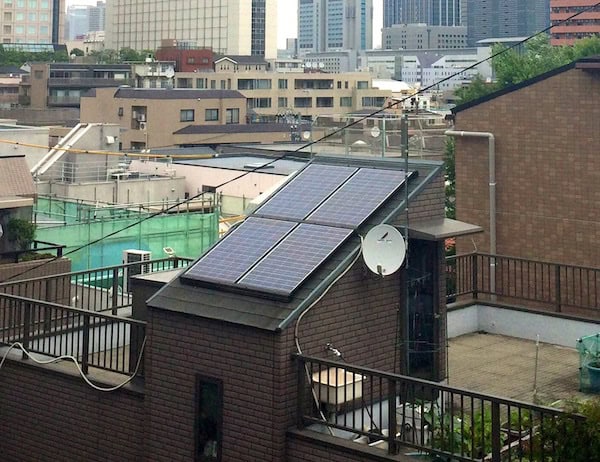
The impact of the 2012 Fukushima nuclear disaster is continuing to ripple out, and yet Japan has already begun revving up its nuclear fleet again. Well, maybe not for long. A blockchain-enabled pilot project to link 100 solar rooftops in the country could grow to encompass 55,000 rooftops within the next two years if all goes according to plan.
Of course that’s still not quite enough to power the whole country, but it could kickstart similar efforts ramp up its renewable energy profile.
Wait — What Excess Solar Capacity?
To be clear, Japan does not have an oversupply of solar capacity overall, at least not yet. The new project is part of a nationwide effort to transfer solar from oversupplied regions into other regions.
The ability to transfer from one region to another is a new thing in Japan. The very first such transfer took place just last October. It involved excess solar power generated on the island of Kyushu, which was shuttled to the main island, Honshu.
Reuters had the scoop:
The transfer of excess solar power supplies from the island of Kyushu to Japan’s main island of Honshu signals an increase in flexibility in the country’s previously regionalised electricity grid as the market opens up to competition.
Kyushu Electric Power transferred up to 1.125 gigawatts on Monday to five utilities including Kansai Electric Power and Chubu Electric Power after approval from the grid monitor known as OCCTO.
The wheels for the deal were set in motion in 2015, when OCCTO was established in the wake of a huge shakeup in the country’s utility sector. The restructuring broke up regional monopolies, creating new opportunities for new players.
There’s plenty more where that came from. Just a few days after Kyushu Electric Power began shedding excess solar load, it still had an excess supply and had to request a halt to production by some solar generators.
The Power Ledger Blockchain Solution
This kind of environment is tailor made for companies that specialize in peer-to-peer trading for solar energy. CleanTechnica has been following one such outfit, Australia-based Power Ledger, which is the company is behind the new 100-rooftop pilot project.
Power Ledger’s specialty is blockchain-enabled software that provides for solar owners to trade or sell digital tokens. Bitcoin and other speculative currencies have given cryptocurrency a bad rap, but workhorse cryptocurrencies are coming from a different place. Power Ledger’s POWR tokens are tied to local currency.
The new project is a partnership with the Japan-based solar installer Sharing Energy Co., Ltd. The first round of activity involves 100 rooftop solar systems recruited by Sharing from among its customers in four of Japan’s nine regions: Kanto, Cyubu, Kansai, and Kysusyu.
Blowing those 100 rooftops out into a fleet of 55,000 within two years seems rather ambitious. However, there is a plan:
Sharing Energy will use Power Ledger’s peer-to-peer platform to facilitate peer-to-peer trading using real-time data from existing smart meters. It will verify the feasibility and scalability of P2P energy trading in Japan and allow Sharing Energy to conduct research on energy transactions via Power Ledger’s blockchain-powered platform.
One key market that the partners aim to penetrate is in the area of multi-family buildings, office buildings, and other multi-tenant structures where the owner typically has little or no incentive to install rooftop solar.
The Power Ledger platform was first conceived as a means of monetizing solar power for both the building owner and the tenants. Ideally, the platform can incentivize property owners to install more solar panels than they need, adding more renewable energy to the pool of share-able resources.
Sharing Energy is already one step ahead. The company supersizes its rooftop solar installations with excess capacity, which it sells through Japan’s residential feed-in tariff. When that tariff expires, Sharing plans to sell to third parties.
One Way Or Another, A Renewable Energy Future For Japan
Speaking of tariffs, Power Ledger and Sharing Energy are pairing up at a particularly opportune time for small scale solar in Japan. The country may put a damper on utility solar scale projects with proposed cuts to its feed-in tariff, but robust interest in home energy storage could help sustain investment in small scale rooftop installations.
Among other projects, Power Ledger has partnered with the major electricity retailer Kansai Electric Power Company on a virtual power plant initiative that uses the blockchain platform to leverage energy storage as well as solar energy generation.
Power Ledger has several other projects in the works around the globe including one here in the US. CleanTechnica is reaching out for an update on that, so stay tuned for more.
